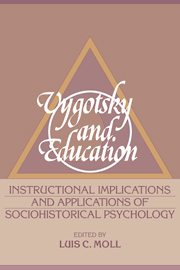Introduction
Published online by Cambridge University Press: 05 June 2012
Summary
I am for practicing psychologists, for practical work, and so in the broad sense for boldness and the advance of our branch of science into life.
L. S. Vygotsky (quoted in Leontiev & Luria, 1968, p. 367)In his introduction to the first English translation of Vygotsky's Thought and Language (1962), Jerome Bruner remarked that “Vygotsky's conception of development is at the same time a theory of education” (p. v). It is noteworthy that 25 years later, in his Prologue to the English edition of Vygotsky's Collected Works, Bruner (1987) elaborated on this same central theme of Vygotsky's work: “When I remarked a quarter century ago that Vygotsky's view of development was also a theory of education, I did not realize the half of it. In fact, his educational theory is a theory of cultural transmission as well as a theory of development. For ‘education’ implies for Vygotsky not only the development of the individual's potential, but the historical expression and growth of the human culture from which Man springs” (pp. 1–2).
Vygotsky regarded education not only as central to cognitive development but as the quintessential sociocultural activity. That is, he considered the capacity to teach and to benefit from instruction a fundamental attribute of human beings. As Premack (1984) has pointed out, the “presence of pedagogy in human affairs introduces a cognitive gap that is not found in other animals.
- Type
- Chapter
- Information
- Vygotsky and EducationInstructional Implications and Applications of Sociohistorical Psychology, pp. 1 - 28Publisher: Cambridge University PressPrint publication year: 1990
- 57
- Cited by



